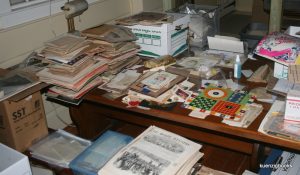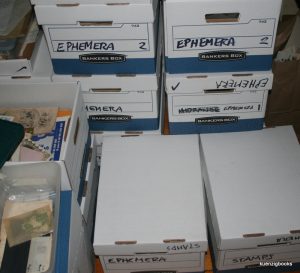As Kuenzig Books prepares for our year-end flurry of bookfairs, Lew Jaffe, a longtime bookplate collector, has just posted a great question to his blog:
What should collectors and dealers do with their collections? What happens if you do nothing?
Lew Jaffe’s original post – Till Death Do Us Part
We commented on his posting, (found below with a few additions). Many others have as well, and the result is well worth reading and thinking about.
======
We’ve twice in the last few years been hired to triage the estates of booksellers who have passed on and left their accumulations to their heirs. The heirs have asked us to attempt to sort thousands of items into the good, the bad, and the ugly. Or, what should be treated specially (valuable or rare), what can or should be wholesaled to dealers or sent to auction, and what should be donated or discarded.
The frustrating thing for us is that often, sans instructions or notes left to the contrary by the collector or dealer, we can be hours (or days) into sorting material only to discover that widely scattered material should more appropriately be kept together. Or that seemingly disparate items belong together (often prompted by an obscure purchase receipt that links things together). While sometimes material bought together should be separated, there is often more value (in our view) in keeping things together when possible. And this often translates into more interest on the part of an institution or potential purchaser.
[ Adding to our comments:
With no documentation, we’re often reduced to sorting big piles:
into “like things”:
This kind of blind sorting causes collections lose their cohesion, but with no direction or pre-sorting or documentation from the collector, this is a common result. Note to dealers: don’t leave the results of 20 years of bookselling to your heirs unless you have at a minimum left some basic instructions about who to call when you’re gone!!! ]
Contrast that with a collector we’re working with now, who, faced with a life challenging medical situation is trying to make plans to divest his collection before he passes. He has a catalog of most of his material, complete with purchase prices and sources, and he only laments the fact that he may not have the time to a) find the best home for portions of his collection, and b) that he probably won’t have the time to document his thoughts on why the whole of the collection is bigger than the sum of it’s parts.
The worst part is when something ends up in a dumpster. Most of the records of writer Harry Stubbs (better known as science fiction writer Hal Clement) ended up in a dumpster, which we found out only after buying some material we recognized at a small auction house. We inquired about and chased that dumpster, but were too late. I knew Hal, and I regret not making sure he had plans for his records (including his typescripts, etc) before he died.
So I heartily thank Lew for bringing up this relevant and timely subject again. And for those who have added great thoughts along the way. We’re all in one way or the other in the business of salvaging history. And it’s worthwhile in my view.
John F. Kuenzig
www.kuenzigbooks.com



